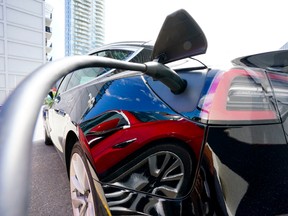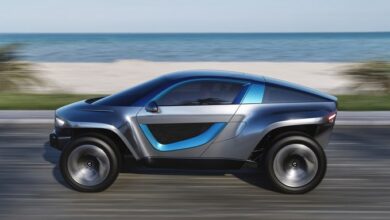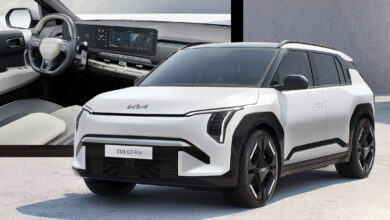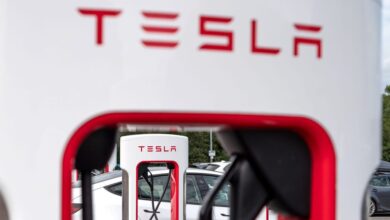Owning an electric vehicle is madness and I regret ever buying one

Recently, all EV owners in my building received notice that we would no longer be allowed to plug in at all
Article content
Canadians have repeatedly been told that electric vehicles (EVs) are the future. The Trudeau government has even mandated that all new vehicles sold in Canada must be electric by 2035 (and 60 per cent by 2030, which is just around the corner). There’s only one problem: to loosely quote Jerry Maguire, “Show me the infrastructure.”
My own vehicle is a short-range plug-in, for which I paid a premium, after clearing with my strata (condo association) that I’d be allowed to charge it. First, I was granted permission to use an extension cord, which I had purchased. Later, we were told that extension cords were no longer allowed due to safety concerns expressed by the fire department. Fair enough. I managed to trade spots with a neighbour.
Advertisement 2
Article content
Article content
But recently, all EV owners in my building received notice that we would no longer be allowed to plug in at all. At least, not until actual Level 2 chargers are installed. When this joyous event might happen is anybody’s guess. All I know is that the idea was brought up at least three years ago, was seriously discussed and no action was taken.
Meanwhile, there are a number of owners who will no longer be able to charge their vehicles at home. Just not enough of them to have any say, since other owners who have gas vehicles, understandably, are not as eager to shoulder the cost of adding chargers.
As for the safety concerns, my vehicle was sold with the assumption that it would be plugged into a regular socket. That was a key selling point. And presumably it had passed safety tests to ensure it could be operated in such a way.
In fact, a study by the Swedish Civil Contingencies Agency found that EVs are 20 times less likely to catch fire than petrol and diesel vehicles.
There’s also a debate over which vehicles pollute more. Opponents of EVs point to the environmental costs of battery disposal and mining for the materials required to make them. Proponents argue that EVs makes us less reliant on oil, that our ability to safely dispose of or recycle batteries is only going to improve and that EVs significantly decrease urban air pollution.
Article content
Advertisement 3
Article content
They are also more fun to drive, with faster acceleration and no noise. Naturally, there’s much debate about which type of vehicle is more enjoyable and we’ll never fully settle that particular dilemma.
The problem is that while the government is pushing for EVs to dominate the market, it avoids a simple reality: EVs are currently only feasible for those who have financial resources. The cost of charging is often on par with filling a gas tank, but takes significantly longer — that is, if you even manage to find an available charger nearby.
So, for most people, charging at home is the practical option. But when you’ve got stratas that can cut off their residents at any moment, this becomes an option only for those who own their own homes, or have moved into condos with sufficient charging infrastructure.
Some cities, such as Vancouver, are now requiring that all new condo buildings provide Level 2 charging stations in every parking spot. But anyone who has bought into an older building has no such assurances. Given the prohibitively high cost of real estate in Canada, personal charging stations will remain out of reach of many Canadians.
Advertisement 4
Article content
Simply legislating that all vehicles sold by 2035 must be electric doesn’t guarantee that there will be options that are as affordable as the gas vehicles that are currently on the market. While I support innovation, and appreciate EVs, there’s something deeply elitist in the government policies that surround them.
Firstly, these should be vehicles that people should want to choose, rather than be forced to. And second, forcing EVs on people without encouraging or building sufficient infrastructure in advance is bound to lead to trouble ahead.
There are some changes coming in certain jurisdictions. In British Columbia, for example, strata corporations will be required to obtain electrical planning reports, which will provide them with information on their electrical systems and expected demand increases due to EV charging and heat pumps. But these won’t be required in Vancouver until 2026 — and as late as 2028 in some parts of the province. And installing new EV infrastructure will still require a majority vote by the strata corporation.
In my current situation, I can’t help but feel like I was misled. I was actively encouraged to buy an EV and the government even provided incentives to do so. But there were no guardrails put into place when my strata decided to cut off my power (without making an alternative option available).
Without proper infrastructure, 100 per cent EVs by 2035 is just a pipe-dream — or a nightmare.
National Post
Katherine Brodsky is a freelance writer, commentator and author of, “No Apologies: How to Find and Free Your Voice in the Age of Outrage—Lessons for the Silenced Majority.” She tweets on X @mysteriouskat and writes essays on Substack: katherinewrites.com.
Recommended from Editorial
Article content





